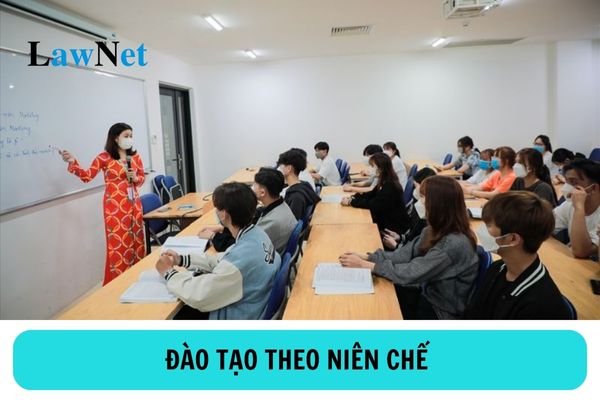What is college-level training by academic year in Vietnam?
What is college-level training by academic year in Vietnam?
Based on Clause 1, Article 2 of Circular 04/2022/TT-BLDTBXH:
Explanation of Terms
In this Circular, the following terms are understood as follows:
1. College-level training by academic year is a method of organizing training by academic year with relatively fixed classes throughout the entire course, allowing students (hereinafter referred to as learners) in the same class to follow a unified training plan and schedule.
- Module or credit-based training is a training method based on each learning content designed into modules or subjects, where learners can proactively choose modules or subjects according to the school's regulations to accumulate until they complete the required modules or credits specified in the program.
- Online training is a form of teaching that allows for partial or complete content delivery of subjects and modules in the training program for intermediate and college-level education to be conducted on the Internet, replacing direct teaching at training locations of vocational education institutions.
Thus, college-level training by academic year is a method of organizing training by academic year with relatively fixed classes throughout the entire course.
Training by academic year allows students in the same class to follow a unified training plan and schedule.

What is college-level training by academic year in Vietnam? (Image from the Internet)
How long is the training duration for the college-level training by academic year in Vietnam?
Based on Point c, Clause 2, Article 3 of Circular 04/2022/TT-BLDTBXH, the regulations on training programs and duration are as follows:
Training Program and Duration
- Training Program
a) The training program specifies the training objectives, the volume of knowledge, the competency requirements that learners must achieve after graduation; the scope and structure of the content; the methods and forms of training; the assessment methods for learning outcomes. The training program is built according to the regulations in Circular No. 03/2017/TT-BLDTBXH dated March 1, 2017 by the Minister of Labor - Invalids and Social Affairs on the process of building, appraising, and issuing training programs; organizing the compilation, selection, and appraisal of textbooks for intermediate and college-level education.
b) The training program must be disclosed to learners before enrollment and at the start of the course. Any changes or adjustments related to the training program must be announced before application, without causing adverse effects on learners.
2. The training duration is the time required for learners to complete a specific training program and be eligible for the corresponding graduation certificate, specifically:
a) The training duration for intermediate-level education using the year-based method for those with a lower secondary school diploma or higher is from one to two academic years depending on the field or occupation of training;
b) The training duration for intermediate-level education using the module or credit-based method is the time required to accumulate the necessary number of modules or credits specified for each program;
c) The training duration for college-level training by academic year is from two to three academic years depending on the field or occupation of training for those with a high school diploma or an intermediate diploma and a certificate of completion of the general education program or a certificate of sufficient high school cultural knowledge or has studied and passed the requirements of sufficient high school cultural knowledge as regulated;
d) The training duration for college-level education using the module or credit-based method is the time required for learners to accumulate the necessary number of modules or credits for each program.
Thus, the training duration for college-level training by academic year is from 2 to 3 years depending on the field or occupation of training.
When are students of college-level training by academic year in Vietnam allowed to pause and retain their academic results?
Based on Clause 2, Article 9 of Circular 04/2022/TT-BLDTBXH, students of college-level training by academic year are allowed to pause their current programs and retain their academic results under the following circumstances:
- Being summoned by competent state authorities to fulfill military service obligations, participate in disaster prevention and control, and epidemic prevention; participate in international exams or competitions;
- Due to health reasons requiring a long-term suspension for treatment, with a medical certificate from the healthcare facility where treatment is received, or having a disability certificate as per the Disability Law 2010;
- Transferring from one school to another within the same field of study where the study pace differs between schools;
- Participating in a program or project to work abroad under a contract or due to family circumstances requiring a suspension of studies;
- During the period of disciplinary action resulting in temporary suspension of studies;
- Being prosecuted with criminal charges but not yet concluded by competent authorities, or concluded by competent authorities but not subjected to disciplinary action of expulsion.

